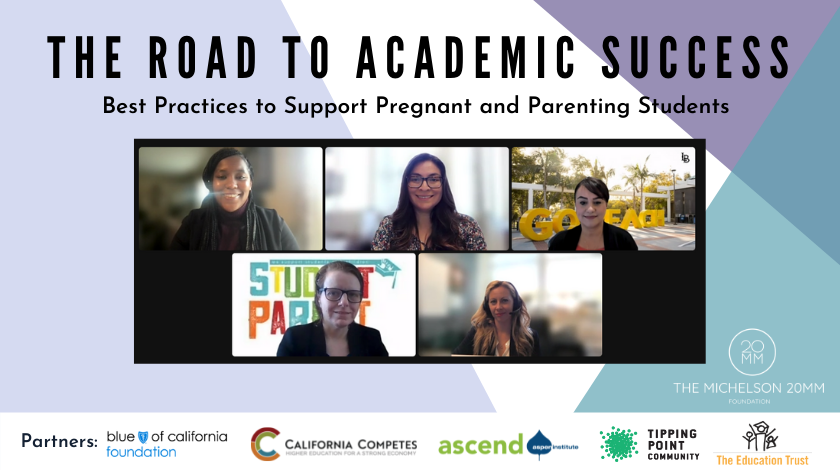By Miguel Leon
Serving student parents is about equity. One only needs to look at the data to see just how substantial the higher education equity gap is for student parents. Students of color make up a disproportionate share of the student-parent population, and research from the City University of New York and the National Longitudinal Survey of youth found that it takes an average of 10 years for low income mothers to earn a bachelor’s degree–ten years– neither for lack of trying nor due to a lack of commitment or dedication. In fact, 41% of student parents earn and maintain a GPA greater than 3.5 versus 29% of non-parenting students. The equity gaps don’t point to a lack of desire, but rather to insufficient institutional support for student parents.
For these reasons, “The Road To Academic Success: Best Practices to Support Pregnant and Parenting Students,” the latest installment of our virtual learning series focused on student parent success, sought to uplift the supports that have emerged throughout California.
Where Do Campuses Start?
The conversation centered around the idea of making campuses family-friendly and fostered the idea of student parent supportive campuses. Panelists encouraged attendees to launch a step-by-step guide to help them begin the journey. First, schools should determine what the needs of student parents are on their campus. This could be done by conducting focus groups or surveys of this population. Second, campuses can conduct a landscape analysis to identify what their campus is already doing in support of student parents, down to the departmental level. The through line for these steps is the idea of creating a campus-wide task force, which would include representatives from as many departments as possible.
The task forces would be responsible for all aspects of working toward a student parent supportive campus. They would establish goals, self assess, and, most importantly, center student voices in their work. While not all campuses have the capacity to embark on this journey, in this way, or at this scale, many campuses are still able to piece together promising practices.
Beacons of Hope
Dr. Mercado Lopez from California State University (CSU), Fresno touted the success of the diaper bank established by the school, which distributes 30,000 diapers a month to students in need. Dr. Roy from CSU Long Beach highlighted how CSULB has leveraged service learning students to staff a family-friendly study area and coordinate activities for student parents as well as their kids. Haley Myers Dillon from Sacramento State highlighted the creation of a village building initiative on her campus, which uses wellness ambassadors to educate faculty and staff on how to work with pregnant and parenting students. In addition, she shared how Sacramento State established student parent community chats and leveraged Child Care Means Access for Parents in School (CCAMPIS) grant dollars to help student parents enroll their children in summer day camps. While incredibly helpful, the biggest challenge for these programs lies in one question: How do you sustain it?
From the Fringes to the Foreground
According to Dr. Autumn Green, the answer to sustainability for student parent supportive campuses lies with the institutions themselves. “Institutions should fund student parent programs the same way they fund programs for other diverse student populations,” she stated.
Institutional investment leads to sustainability, yet a lack of data on student parents blocks the justification of such investments. When a lack of data persists, student parent stories become even more critical because they center student parent experiences and voices in the fight for eliminating the silos that emerge when departments piece together what they can with what they have. To truly incorporate student parent work into the DNA of colleges, Michelson 20MM co-chair, Alya Michelson reminded us that “ingenuity, innovation, collaboration, and compassion can have a lasting, positive impact on parenting students.” Meanwhile, Dr. Green reminded us that “[student parent work] is what we all do, this is what we all should do”.
If you would like to learn more, you are invited to view the recording on our YouTube channel, read the full transcript, and access additional resources mentioned during the event.
Michelson 20MM is a private, nonprofit foundation seeking to accelerate progress towards a more just world through grantmaking, operating programs, and impact investing. Co-chaired and funded by Alya and Gary Michelson, Michelson 20MM is part of the Michelson Philanthropies network of foundations.
To sign up for our newsletter, click here.
